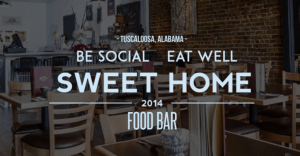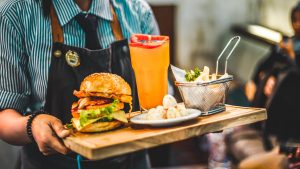Small Businesses: International Effects at the Local Level
Published on April 15, 2020, at 8:36 p.m.
by Katie Poedtke.
There is no doubt that COVID-19 is changing the world right before our eyes. The news cycles consistently report on the new developments of the pandemic. People are self-quarantining to keep the virus at bay. Industries are adapting in order to support the essential workers who risk their lives every day.
Among the notable individuals making a difference in their communities during these times are small-business owners and employees.
Small businesses across the world are experiencing financial difficulties as they navigate through these unprecedented circumstances. These businesses are forced to adapt and re-evaluate their abilities to serve their communities.

Obstacles to making a profit
As expected, several small businesses are having trouble keeping their doors open. Debra Rubino, a representative of Sweet Home Food Bar in Tuscaloosa, Alabama, experiences the unpredictable business days herself. “There have been good days, [and] we get our hopes up. Then, the next day [there is] practically no business at all.”
Rubino continued, describing how to manage a socially distant, pick-up routine for customers. Sweet Home Food Bar was expecting to deliver food more often, but Rubino noted, “Everyone seems to want to just get out of the house and go for a drive.”
John Papaioannou, owner of Legends Grill and Bar in the Chicagoland area, deals with the restricting situations in a similar fashion. Over the last several weeks, Legends has been offering curbside pick-up and carry-out options.
Papaioannou explained that he is offering a full service with a skeleton crew to keep the business running. Obviously that is not the preferred course of action, and Papaioannou emphasized:
“I want to keep as many people as I can employed.”
What has been the biggest obstacle, according to Papaioannou? Fear. “It seems as if everyone is in fear mode,” he said. “It depends on the tolerance of how worried you are about the environment.”
Sweet Home Food Bar faces a different challenge of being located in a college town. With students and faculty returning home to obey the social distancing guidelines provided by the school, city and state, Rubino reflected, “It’s like summer in March.”

Papaioannou painted a different picture describing the activity in Mokena, Woodridge and Yorkville. Chicago’s streets are deserted, and everyone who used to commute downtown for work is now working from home. Because of this change, the suburbs’ small businesses have a fighting chance. At Legends, Papaioannou has seen that the “population for lunch and dinner [carry-out] has grown.”
Creative solutions and contributions
Inventive responses to difficult challenges bring small businesses customers and revenue. Carry-out and curbside pick-up keep the small businesses alive, and there are several ways to continue making progress.
Papaioannou illustrates the hard work his Legends locations engage in, ensuring that the restaurant is sanitized after each meal preparation, as well as having staff members wash their hands after every order. Rubino explained similar measures to keep Sweet Home Food Bar safe and clean. Papaioannou urges customers to bring their own pens to sign for the food as a precaution, and Rubino advises people to bring reusable bags.
In addition to providing meals, Legends has programs at each location to offer their assistance in any way they can. At the Yorkville location, employees deliver food to nursing homes and other places where people cannot leave their homes. Legends also donates food to local hospitals to support the essential workers.
Social media makes a difference
One PR tactic stands out amongst the rest — social media engagement.
Social media helps small businesses stay in touch with their audiences while still abiding by stay-at-

home rules. It has been instrumental in getting the word out for Legends and Sweet Home Food Bar.
Papaioannou pointed out that most people are stuck at home scrolling on social media. He uses this opportunity to his advantage by posting pictures of the food and offering specials and different kinds of options. He believes, “the biggest impact has been social media.”
At Sweet Home Food Bar, a few of Rubino’s employees have social media and marketing experience. She notices that “within minutes of posting, [we] get calls for orders.”
Next steps
As we move forward into the unknown, it is integral to keep following the guidelines from the
government and buy from small businesses to keep them open. In addition, Rubino suggests that people “continue to support those who need to remain open, [such as] supermarkets, drugstores, gas stations and restaurants.”
Papaioannou is hopeful that once the government lifts quarantining restrictions, business will spike. “Everyone will be tired of staying inside, and business will be booming.”
Until that time comes, there are ways for your small business to stay open during this time. The U.S. Small Business Administration has resources and options for small businesses to utilize. Other helpful options and advice for owners can be found in the U.S. Chamber of Commerce small business guide. Forbes also has a list of potential loan and grant programs that could be useful for small-business owners during this pandemic.
Although venturing from our homes to pick up carry-out or support local businesses can seem scary, Papaioannou said that sanitation levels are the highest they have ever been, and, “if there was ever a time to eat out, I think it is now.” Unless people are visiting essential businesses, Rubino reminds the public to “stay home” in order to stop the spread of COVID-19.




